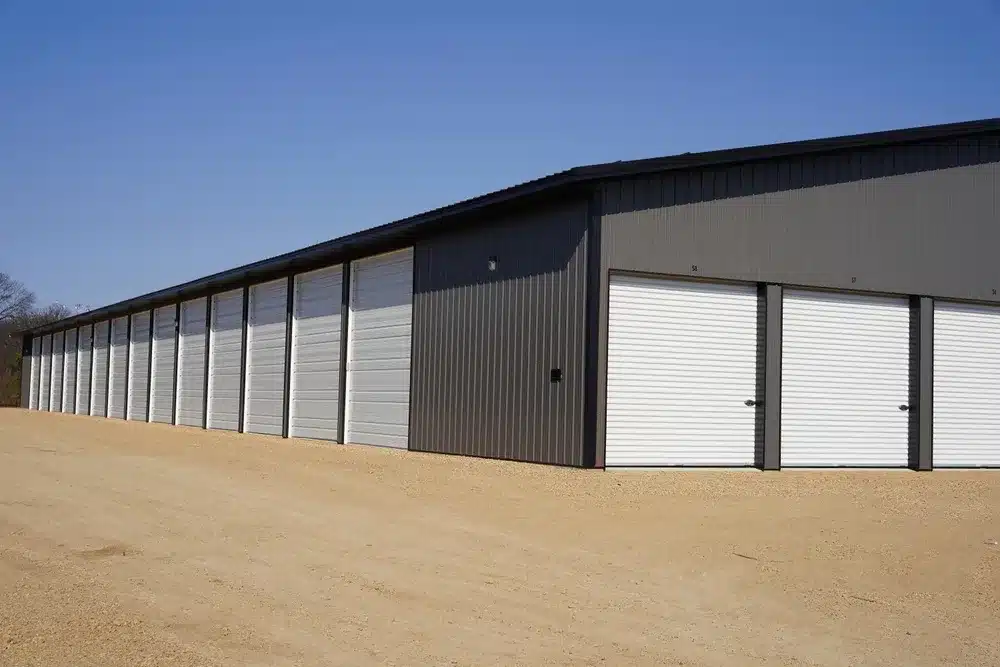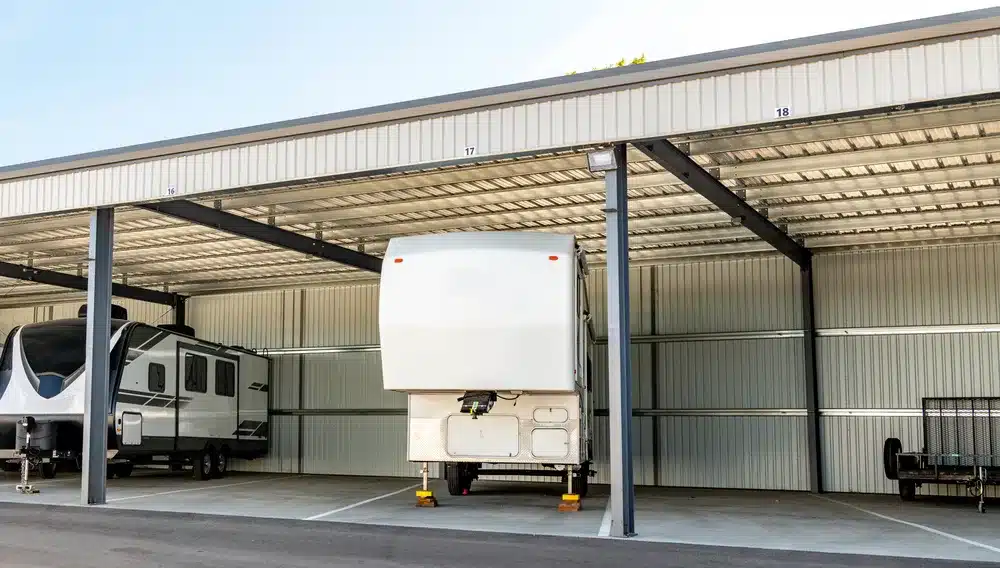Car storage can be a good idea if there isn’t enough room left in your garage anymore or you want to protect a car that you don’t use on a daily basis. On the other hand, it is very important to understand just how much car storage costs and what influences vehicle storage prices before making a decision.
The cost of car storage varies, as you are about to find out, depending on the type of storage you select, the location of the facility and additional security features or even amenities such as climate control. Knowing these will let you find the right storage option for your car and wallet.
Average Cost of Vehicle Storage
Many cars can fit in a 10×20 self-storage unit, which so far this year has an average rental price of $139.59 per month. Trucks and smaller RVs can fit in a 10×30 unit, while 40-foot and up units can accommodate larger vehicles. Below are average prices for common vehicle storage sizes:
- 10×20: $139.59
- 10×25: $179.70
- 10×30: $152.92
- 10×40: $132.30
Vehicle storage prices can greatly differ depending on where you live, the type of storage chosen (indoor, outdoor, covered) and the size of your car. These prices are also influenced by the availability of specific unit sizes in your area and at the facility level.
Car storage cost by storage type
- Indoor car storage is the most expensive form of car storage, due to the extra protection and security it offers, especially when it comes with climate control.
- Outdoor vehicle storage is typically the most affordable option, advisable for short-term storage or vehicles that can withstand exposure to the elements.
- Covered storage falls in between indoor and outdoor storage in price. You’re compromising — you still get some protection from the sun and rain, but without the costly price tag of a fully enclosed space.
City-Specific Comparisons
Car storage prices vary greatly from city to city and, at times, even by region, not to mention the time of the year. Major cities with a small supply of space but a high demand stand out from the national averages, with higher costs for car storage than the suburbs.
So, how much does it cost to store a car in New York City compared to Los Angeles or Chicago?
Below is the average price in 2024 to rent a 10×20 unit in these three major cities:
- New York: $353.46
- Los Angeles: $302.30
- Chicago: $143.29
Regional variations
Major cities aside, what influences vehicle storage costs by region?
- In colder regions, indoor car storage may be more expensive during winter months due to higher demand as people look to protect their vehicles from snow and ice.
- In coastal or high-humidity areas, there is greater demand for climate-controlled units throughout the year, especially during summer, and climate control comes with a higher price.
- Most homes in the West and South don’t have basements, so people often use their garages for storing bits and bobs. This means they must find another spot to store their less frequently used car, driving up demand for car storage in their area.
Factors Affecting Storage Costs
Several things affect how much you’ll end up paying for car storage. These factors may include, but are not limited to, location of the facility, size of the unit and the amenities available.
1. Location
Facilities in busy urban areas often charge more than those in suburbs or rural locations. Higher property values in the area can also push car storage prices up.
Paying for a vehicle storage facility closer to your home or work is no doubt convenient but could come with a higher price tag. If you’re willing to drive a little further when looking to store your vehicle for a longer period, you might save a few bucks.
2. Storage unit size
Standard sizes for car storage range from 10×15 feet for smaller cars to 10×20 or 10×30 feet for bigger vehicles like SUVs or trucks. The larger the vehicle, the more space it needs, which means a higher cost.
3. Amenities and security features
Places with added security, like surveillance cameras, gated access, on-site managers and individual unit alarms, often charge a premium. Climate-controlled units, which protect against humidity and temperature swings, can also raise the cost.
Types of Vehicle Storage
Different types of car storage offer different levels of protection and convenience at different prices. Which one is the right choice for you — indoor, outdoor or covered vehicle storage?
Indoor car storage
|
Benefits |
Best protection from weather, theft and damage. Ideal for long-term storage or cars that need extra care, like classic or luxury vehicles. |
|
Features |
Often comes with added security, such as surveillance cameras, alarms and restricted access. Climate control is also a common feature of indoor vehicle storage, preventing damage from humidity and temperature changes. |
|
Accessibility |
Safe, enclosed environment similar to a personal garage, often with easy drive-up access. |
|
Cost |
Generally the most expensive option due to the high level of protection and additional features. |
Outdoor car storage
|
Pros |
The most affordable storage option. Suitable for short-term needs or cars that can handle exposure to the elements. |
|
Cons |
Offers minimal protection from weather, theft and vandalism. Cars stored outdoors may experience damage from sun, rain, snow or critters. |
|
Accessibility |
Often provides 24-hour access, making it easy to retrieve your car when needed. |
|
Cost |
Typically, the lowest cost, due to the lack of enclosure and fewer amenities. |
Covered car storage
|
Overview |
A middle-ground option that provides a roof to protect the car from direct sunlight and some rain and snow. It offers more protection than outdoor storage but isn’t fully enclosed like indoor storage. |
|
Features |
Generally includes some level of security, such as gates or perimeter fencing, but may not offer the same advanced features as indoor storage. |
|
Accessibility |
Comes with drive-up access, making it easy to park and retrieve your vehicle. |
|
Cost |
Priced between indoor and outdoor vehicle storage, it balances protection and affordability. |
Tips for Finding Affordable Storage
Finding the right car storage solution doesn’t have to break the bank.
1. Search for discounts
- Many storage facilities offer promotions like the first month free, discounted rates for signing a long-term contract or seasonal deals. Check their websites or call to ask about any current offers.
- Don’t be afraid to ask for discounts, especially if you’re a senior, a student or a member of the military. Some facilities also offer referral bonuses or discounts if a current customer refers you, so ask around the neighborhood for recommendations.
- Use comparison websites to find affordable car storage options near you. These sites often highlight discounts and deals available at local facilities.
2. Evaluate facility amenities
- Consider which security features are important for you. Facilities with gated access, surveillance cameras, on-site managers and individual alarms might cost more but offer better protection.
- Think about whether climate control is necessary for your car. If you’re storing a vehicle in a region with extreme temperatures or high humidity, climate control can prevent damage but will increase costs.
- If you use your car a lot, make sure you get facilities with 24-hour access. However, remember that extended access hours can sometimes come with higher fees.
- Decide which amenities are worth paying extra for. Possible extras to consider may include extra-wide spaces with easy parking, or drive-up access.
3. Consider location and accessibility
- If you need to access your car frequently, choosing a facility closer to home or work will be worth the extra money.
- If you want to store your car long-term and will not need to have access to it consistently, then consider a location further outside urban areas. These are often cheaper due to lower land costs and less demand.
- Remember to factor in the cost of traveling to and from the car storage location. Sometimes, a slightly more expensive facility closer to you might save money in fuel and time over the long run.
FAQs on the Cost of Car Storage
Besides vehicle storage costs in major cities like NYC or LA, many car owners and first-time storage renters wonder about the appropriate storage unit size to minimize monthly costs.
Is a 10×10 storage unit big enough for a car?
No, a 10×10 storage unit is too small even for the smallest new car currently sold in the U.S. — which, according to Carfax, is a 2024 Mitsubishi Mirage. At a little over 12 feet and 7 inches long, you can see why a 10×10 storage unit is not enough. This unit size might still be suitable for smaller vehicles like motorcycles, scooters or compact ATVs.
Will my car fit in a 10×20 storage unit?
Yes, a 10×20 storage unit is generally big enough to store most cars. This size is ideal for sedans, small trucks and even some SUVs, as it can accommodate vehicles up to 19 feet in length with enough room to move around the car.







